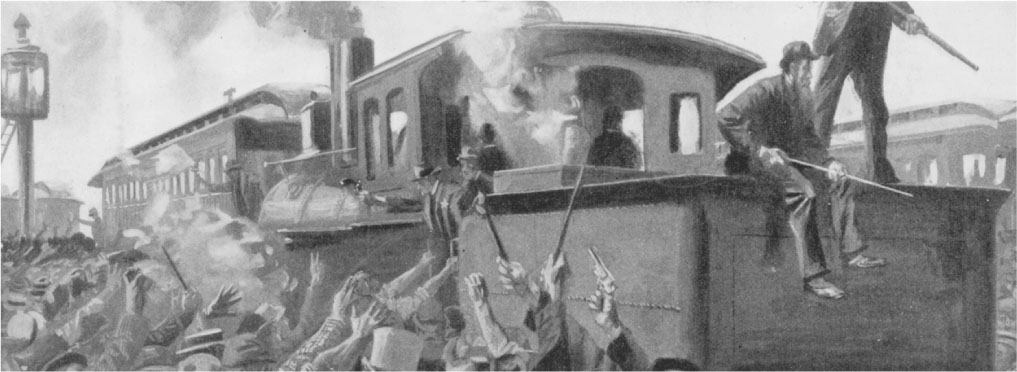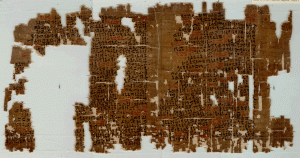
George Mortimer Pullman was an engineer and ambitious entrepreneur. He found success as a building contractor. In 1867, Pullman created a new line of luxury railroad cars featuring comfortable seating, restaurants, and improved sleeping areas known as Pullman coaches. Following his success in 1867, he built a town on a four thousand acre piece of land. There, twenty-seven years after his initial success, one of the most dramatic events in United States labor history took place: the Pullman Strike.
In 1880, near Lake Calumet on the southwest edge of Chicago, the village of Pullman was built. His town contained a hotel, a school, a library, a church, and office buildings, as well as parks and recreational facilities. Pullman also built houses with indoor plumbing and gas heating. He managed his town as he did his other businesses; he leased the housing to his workers.
Many factors contributed to the economic downturn of 1893. The nation’s gold reserves dropped drastically, federal spending depleted U.S. Treasury surpluses, and finally the passage in 1890 of the Sherman Silver Act culminated in the financial panic of 1893. 1 All of these events unleashed a domino effect on the American economy. Corporations failed, resulting in mass layoffs. Many banks also closed, unable to keep afloat during this chaotic time. Combined, all of these closures and general uncertainly plunged the country into a major economic depression. Pullman’s response to the crisis was to fire more than a third of his workforce; he instituted reduced hours and cut the wages for the remaining hourly employees by more than twenty-five percent. Because Pullman had promised the town’s investors a six percent return, there was no corresponding reduction in the rents and other charges paid by the workers. Rent was deducted directly from their paychecks, leaving many workers with no money to feed and clothe their families.2
In desperation, many of Pullman’s workers joined the American Railway Union (ARU). Eugene V. Debs was the organizer of the ARU and well known for a strike against the Great Northern Railway company. In May of 1894, Pullman workers went on strike. Workers agreed to permit trains carrying the U.S mail to operate as long as they did not contain Pullman cars. Railroads refused to participate. Despite Debs’ opposition, an ARU convention voted to stop handling Pullman cars after the company ignored efforts to settle the dispute. The union, by detaching Pullman cars from the trains, sought to deplete the revenues of the Pullman Palace Car Company (PPCC) and force negotiations.3 George Pullman refused to negotiate. As the strike proceeded, rail lines were shut down and the railroads formed the General Managers Association (GMA), an organization of twenty-four railroad companies operating in or through Chicago. The railroads were determined to honor their contracts with the PPCC, insisting that trains run with Pullman cars attached. Alarmed at the rapid growth of the ARU, they were eager for a chance to crush it.4

The ARU responded with a union walkout, and fifty thousand railroad workers walked off from their jobs. When striking workers refused to spread out and end the strike, U.S. attorney general Richard Olney, who supported the GMA, obtained an order holding the workers in contempt, declaring the strike illegal. Richard Olney requested federal troops, saying they were needed to move the mail, and President Grover Cleveland sent more than two thousand troops to Chicago. Rioting and fighting broke out between the troops and the strikers. Many strikers were killed and wounded by the troops. Debs was arrested and charged for disobeying the court order and for conspiracy to obstruct the U.S. mail. Debs spent six months in prison. Many workers returning to their jobs found out that they had been permanently replaced and blacklisted from future railroad work.
The failure of the strike was a major defeat for labor unions in the United States. The ARU fought for what they believed was right as labor workers, but with the unfortunate disagreement, and the undesirable fight against business management, and no agreement between both ARU and GMA, the strike came to an end by the federal government.5 Clearly, the Pullman Strike of 1894 was not only a defeat for American labor, but it had a significant impact on the life and welfare of American workers for decades. One legacy of this event, however, was the federal government’s decision to declare a national holiday, known as Labor Day, six days after the end of the strike.
- Columbia Electronic Encyclopedia, 6th Edition, April 2016, s.v. “Sherman Silver Purchase Act.” ↵
- Salem Press Encyclopedia, January 2015, s.v. “Pullman Strike,” by Merl E Reed and Irwin Halfond. ↵
- Salem Press Encyclopedia, January 2015, s.v. “Pullman Strike,” by Merl E Reed and Irwin Halfond. ↵
- Salem Press Encyclopedia, January 2015, s.v. “Pullman Strike,” by Merl E Reed and Irwin Halfond. ↵
- Salem Press Encyclopedia, January 2015, s.v. “Pullman Strike,” by Merl E Reed and Irwin Halfond. ↵




42 comments
Emily Velazquez
Before reading this article, I was not informed in the least about the Pullman strike. Now that I have read this article, I am happy to say that I am. I never knew that the whole reason behind Labor Day was started with these railroad workers. They had very unfair wages for the job they were asked to do and that is why they went on strike. Although they were not successful at the moment for themselves, they stood for something very important and it did leave an impact up to this day.
Indhira Mata
I had heard of many labor strikes from the past because of unfair treatment and unfair pay. I did not know that this specific strike lead to the the creation of Labor Day in order to honor those who lost their lives for their rights. In today’s line of work it is okay to ask for a raise, but with Pullman you would lose your job. It is crazy what an outbreak happened.
Hector Garcia
Its abhorring to read of how the workers in the strike were treated and it shocked me on how the government responded. I cannot believe what these people had to endure, especially after they’re wages and hours were cut. And to make things worse, the company left the workers no money for food and clothing. I felt that this article was able to capture the events that transpired in 1894.
Monica Avila
It is very surprising to know that the strike led to the national holiday that is Labor day. I had never thought to look up the origin of labor day, but to read that the strike of railroad workers, and the power of unions led to its establishment is mind blowing. At the start of the article, I was very much looking forward to reading that the workers had prevailed, yet sadly they did not, their struggle was not for nothing. Unions and collaborative bargaining can go a long way, and today workers are protected to a great extent. From unequal pay, to discrimination, labor unions are established to ensure that workers that compensated as fairly as possible, and it is very interesting to know that the great holiday of labor day originated here.
Auroara-Juhl Nikkels
Laboe day is one of those holidays that I never questioned the origin. I had also never heard if the Pullman strike so I am not surprised to learn that this was the beginning of the labor day holiday. Reading your article, I thought there was going to be a happy, winning end for the workers. I was wrong. They only wanted more money. In the end, they list their jobs. It does not seem fair to me. This was a very good article, very well written. Good job!
Kayla Lopez
Labor Day has always been a holiday that I never questioned the origination of. After reading this article I now know that it was due to railroad workers going on strike due to unfair wages. I found it sad that this strike was unsuccessful and many of the workers, once the strike ended, were unable to go back to work on the railroads. This was very eye opening and I can now say that I know why Labor Day is a national holiday.
Mariah Cavanaugh
While reading your article I was eager to get to the end and see that they railroad workers eventually prevailed and won! Sadly, that was not the case. I admire the fact that they risked what little they had to stand up for what they believed was right. Even though this story does not end well for them it does speak to the power of unions and collective bargaining. Fantastic article!
Crystalrose Quintero
I appreciated that the first paragraph proposed the major historical event to occur. The second paragraph changed topics by describing what Pullman had built in his community. And then circled back to factors that were a key factor in the pullman strike, or rather, historical event. The closing paragraph brought all of the article together and indicated the impacts that resulted from such a negative occurrence.
Hayden Hollinger
I had no idea what the Pullman Strike was but I was glad I read your article. I thought it was well researched and featured images that did a great job to keep me engaged. This was a very informative article and was very surprised to read that this strike caused Labor Day, which was an event I never knew the purpose of. I am definitely glad I chose to read this article and well done on the good job.
Luke Trevino
If you were to ask me before reading his article, “why America had labor day?” I would be stumped. I would of never known that it was the Pullman strike that caused America to have Labor day. What really blew my mind is that these workers asked for more money and eventually ended up losing their job. Overall very good article! thank you for teaching something new about a holiday I celebrate.